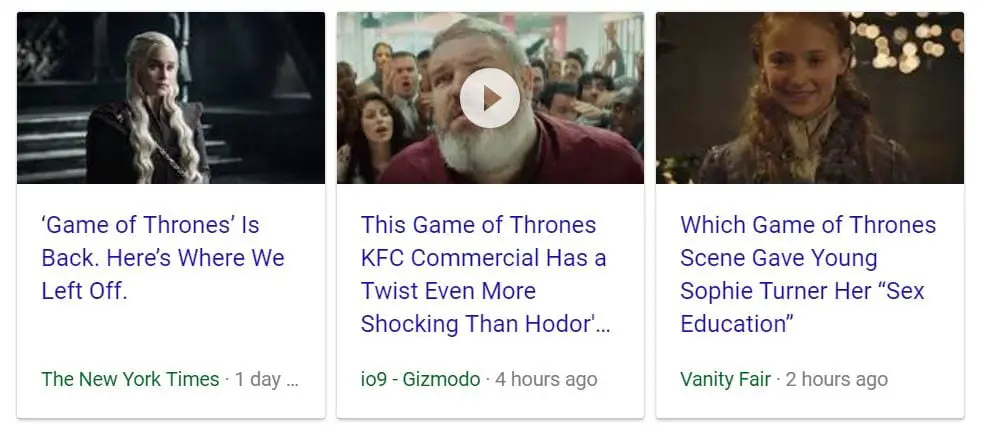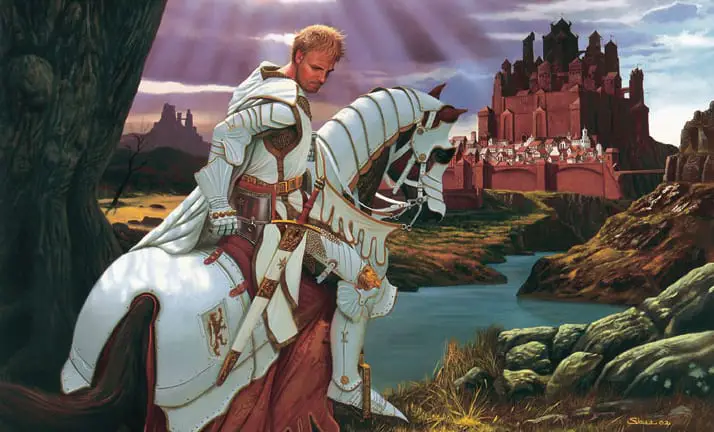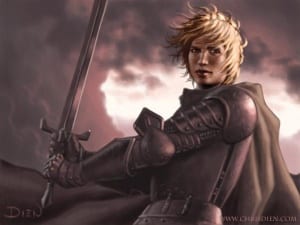As I look at the remains of my leftover blueberry pie, the outside air no longer filled with the mild smokiness of barbeques, there is an inescapable fact upon us: it is July. Mid-summer. 2017. And you only have to take a small peak on the internet to know what that means.

Game of Thrones Season 7 is upon us. Yes, we’ll be here covering it as we have been: snark and all, because there is a value in it. And fine, maybe it can rise from our opinion of it being a truly abysmal show; we’ve been wrong in our lives before. But it only takes a quick glance around here to see that we are quite committed to our “unabashed” book snobbery. Because yes, the books are better! They always are, and even if we manage to witness a coherent season that’s devoid of god-awful implications, they always will be.
The thing is, while I love and enjoy all of George R.R. Martin’s A Song of Ice and Fire, what I truly love about it is most strongly on displayed in the one book that is generally cited as being the weakest: A Feast For Crows. There’s many reasons why this might be, the largest in my opinion being a subversion of genre expectations, and some of the complaints even hold water. Originally, Martin had planned a five-year time jump after A Storm of Swords. Because of this complete change in plan, Martin took a number of years to figure out how to make it work, and made the decision to release a novel that was geographically split from the book that would follow, rather than chronologically.
In other words, Feast contains only half of Martin’s established point-of-view (PoV) characters, though they go through full arcs. Which is empirically frustrating, especially for the fans that waited five years for it.
Then we’ve got the fact that the “action” almost grinds to a halt after the rather ridiculous pace of the third book. What do we focus on instead? Well, in some ways you can think of it as the stuff Martin wanted to skip, so the “why should we care” mentality held by some fans is…not without reason.
Finally, Martin decided to expand his PoV list—and the world of Westeros—by adding two completely new theaters: the Iron Islands and Dorne. Even already-established areas saw new perspectives added, namely Brienne and Cersei, whose combined chapters make up a whopping 39% of the entire book.
So to summarize, it’s a book that took years to come out, didn’t catch readers up with half of the characters (three of whom are the most popular in the fandom), is slow-paced, has a bunch of new plotlines, and explores the headspaces of characters that had so far been secondary actors at best. Why on Planetos would I not only like this, but consider it the best book in the series so far?
The answer all has to do with what I see in this book series in the first place. When I first started reading A Song of Ice and Fire, it was because I was hugely into Game of Thrones (I know!), and found it to be smart (no seriously, I know). There was political intrigue, the subversion of traditional tropes, and classical fantasy elements…all things right up my alley. I needed to learn more about this world. The books obviously don’t disappoint on that front, and I made my way through all five (bandwagon ahoy!) relatively quickly. The plots were knotty and satisfying, there was a complexity to each situation, and the close-PoV structure was unlike any I had ever read.
Oh, and I found A Feast for Crows really boring.
Don’t get me wrong, there were aspects that struck me just right. I remember skipping ahead to Arianne Martell’s next chapter after finishing “The Queenmaker,” because I *had* to know what happened. But god, how much could I read of Brienne wandering around the riverlands asking the same damn question, or Jaime wandering around the riverlands repeating the same slut-shaming mantra about his sister, or Sam chilling on a boat, or Sansa chilling in The Vale. And don’t get me started on the Ironborn!

Then I reread the books, and all of a sudden Feast made sense. Hell, the series made sense. Because once I was able to ignore plot expectations—once I stopped turning the page to find out what happened—the true brilliance of Martin’s world shined through.
I didn’t know it at first, but the close PoV structure is so affecting because it forces the attention on a truly character-driven story. What happens to them matters, and certainly drives their actions, of course. But what matters more is the realizations they come to and the way they relate to the world. The way their perspective can be juxtaposed against others to provide a fuller context to the setting and see how such a violent, patriarchal system manifests in day-to-day lives.
As soon as I began considering plot as secondary to these character arcs, the central messages and themes of the story jumped out. Feast was perhaps the most grim, disturbing book of the bunch, and yet its central meaning is one that can be described as romantic, in a classical sense. Through broken characters and a broken landscape, Martin was able to hold a light up to the inherently unsustainable nature of the feudal order. Violence wasn’t worshipped, and pacifism was often far more daring. Underneath it all, A Song of Ice and Fire is an uplifting tale, and each PoV character struggles with where they fall in it. As Martin puts it:
“The battle between Good and Evil is a theme of much of fantasy. But I think the battle between Good and Evil is fought largely within the individual human heart, by the decisions that we make.”
While this is a feature of every book in the series, Feast forces the reader to slow down and dwell on it. The two major travelogues, Jaime and Brienne’s chapters, show the war-ravaged Westeros, where the reader must deal with the consequences of the faster-paced action that had come before. Yet both characters aren’t simply voyeurs to tragedy; they struggle with their own conception of honor, what it means to be a knight, and what their place in the world is.
As does everyone else in Feast. The thematic cohesion is almost staggering. With the mild exception of Victarion and Aeron, who seem to have the introspective capabilities of pieces of driftwood, every single PoV found in the book centers around identity. Sometimes it’s the intersection of the personal and political, like how Arianne and Asha both fight for their birthrights while desperately clinging to what they believe should be (and is?) their place in the world. Other times, we see characters such as Sansa and Arya trying to shed their former identities only to find out it’s not quite so easy. In the middle of it all, there’s Cersei and her self-delusions, determined to rule as she believes she was destined for, which can be easily juxtaposed to Sam trying to deny his place in the world as a hero when he so obviously fits the bill already.
Another striking aspect is how female-driven this book is. 57% of its chapters are from a female PoV. Keep in mind, conversations are considered “female dominated” if women participate 30% of the time. A common critique of Feast is that rape could almost be considered a minor theme of the book, and I’d be lying if I said the prevalence of sexual violence as a threat or mention wasn’t high. But it’s situated in these PoVs where Martin goes out of his way to show the caustic influence of the patriarchy, from Cersei’s internalized misogyny, to Brienne’s near-dysphoric discomfort, to Arianne’s unabashed assertions of her own sexual agency, to Sansa beginning to weaponize her “armor of courtesy.” Given the typically gendered nature of sexual violence in our society—and in Martin’s world especially—it doesn’t seem to be a coincidence that he chose Feast to delve deeply into the topic, while making an effort to prioritize the female voice.

Not that Martin shies away from the influence of the setting on men, either. Within Feast, Sam and Jaime feature the most strongly, to men who are [now] not martial to the standards of the world, yet still trying to navigate it. Then there’s the Ironborn male PoVs, who are nearly parodies of the patriarchy. Reading these against each other, it becomes quite clear how sexism isn’t so great for men either (shocking!), and you find yourself won over by those characters who push towards healing, whether on a societal-level or within their own mind. Again, none of this can be by accident.
Perhaps babbling about Patriarchy Brain is not the way to convince anyone of Feast’s value, but it does demonstrate just how much there is to this book. This is just one theme Martin heavily plays with, and there are many to be found. Honor, identity, war, duty…each of these comes up again and again throughout the book, with the inherent messiness never once glossed over. Hell, simply reading Feast with the theme of “futility” at the forefront of your mind will cast each chapter in a new light.
The best way I can explain it is that the more effort you put into this book, the more you get out yourself. It gets deeper each pass-through, and the nuances of each characters’ headspaces continue to unfold. Frankly, five years to write this thing seems rushed in some ways.
And…yeah, I know exactly how this kind of gushing makes me sound. Snobbish to the Nth degree, like those people who tell you that you just can’t understand a certain band’s music unless you were listening to them practice in their parents’ garages from the start. There’s nothing wrong with enjoying a piece of media for the ride, truly.
It’s just that Feast isn’t your enjoyable fling. It’s a high-maintenance relationship, sure. But it will love you back, and love you for a long time, if you’re willing to put the effort in.

